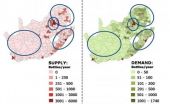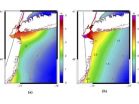(Press-News.org) In the developing world, allocating limited health care resources as effectively and equitably as possible is a top priority.
To address that need, systems engineers at the Georgia Institute of Technology are using computer models to help resource-poor nations improve supply chain decisions related to the distribution of breast milk and non-pharmaceutical interventions for malaria. They are also forecasting what health care services would be available in the event of natural disasters in Caribbean nations.
"We are using mathematical models implemented in user-friendly tools like Microsoft Excel to improve the allocation of limited resources across a network, especially in resource-poor settings," said Julie Swann, an associate professor in the H. Milton Stewart School of Industrial and Systems Engineering at Georgia Tech.
Swann reported on three global health case studies designed to improve the allocation of limited health care resources on Feb. 19, 2012 at the annual meeting of the American Association for the Advancement of Science (AAAS) in Vancouver, Canada.
For the first project, Swann and a group of graduate students created models to strategically determine how a nongovernmental organization (NGO) in South Africa should expand its breast milk donation and distribution network to the whole country. In the network, healthy mothers donate breast milk, which is stored in a local repository, transferred to a milk bank to be processed and then distributed to neonatal units where mothers cannot provide it themselves because of disease status or physical inability.
"We wanted to determine how we could provide breast milk to the most people while also being geographically equitable in terms of access," explained Swann, who holds the Harold R. and Mary Ann Nash chair at Georgia Tech. "We looked at the cost of equity and how that changed the distribution design."
To determine where the organization should expand its network and the best way to do so, the team used operations research to examine the existing and proposed locations in the network as well as what type of transportation would work best to cover the increased geographic area. The model recognized that breast milk supply increases with higher income and education levels and low HIV prevalence, while breast milk demand increases with lower income and education levels and high HIV prevalence.
The researchers recently recommended locations for expansion to the NGO and advised the organization to pay a courier service to carry the milk to the neonatal units, in order to balance cost and reliability and improve efficiency. Volunteers, who are inherently less reliable, were driving the milk from one location to another.
In another project, done in collaboration with the World Health Organization, Swann and a team of undergraduate and graduate students used models to optimize the distribution of non-pharmaceutical interventions for malaria, such as nets or sprays, with pilot data from a country in Africa called Swaziland.
Their models provided a time-based deployment plan for the country, including details on what geographic zones to target for spraying, when to deploy in each zone, how many people can be protected in each zone, what resources should be located at the distribution centers, and the opening and closing dates of the distribution centers.
The researchers showed that using a systems approach to examine allocation decisions could increase the number of people covered with the same amount of funding by more than 25 percent. The team worked with Pinar Keskinocak, a professor in the Stewart School of Industrial and Systems Engineering at Georgia Tech, to develop a teaching game based on the work. The game has been used worldwide in classes of humanitarian students.
For the third project, Swann and a team of graduate students are using technology to estimate the performance of disaster preparedness plans in advance of an event. The project is part of the Caribbean Hazard Assessment Mitigation and Preparedness (CHAMP) initiative, which is supported by a Georgia Tech alumnus and led by Reginald DesRoches, a professor in the School of Civil and Environmental Engineering at Georgia Tech.
In Puerto Rico, Swann's team evaluated the existing hospital networks and other health care provider locations described in the island's emergency preparedness plans.
"To forecast the country's ability to provide health services following an earthquake, we took population data and overlaid it with projections of earthquake locations and severity to estimate the capacities and amount of congestion that would result at health care facilities," said Swann.
The researchers recently presented the initial results of their study to the Puerto Rico Department of Health and made recommendations for health care resources and hospital capacities based on predicted bottlenecks in the system. They are currently examining Belize's hurricane evacuation plans. Keskinocak and Stewart School of Industrial and Systems Engineering associate professor Ozlem Ergun and visiting assistant professor Pelin Pekgun-Cakmak are also contributing to the CHAMP initiative.
"We have found that technology innovations like mathematical models can help to solve problems in global and public health, such as the allocation of limited health care resources," noted Swann.
INFORMATION:
Engineers improve allocation of limited health care resources in resource-poor nations
2012-02-24
ELSE PRESS RELEASES FROM THIS DATE:
The Bar Code News Offers Increased Subscription Options: Free Daily, Weekly, Monthly E-News and Quarterly Print Editions
2012-02-24
The Bar Code News (www.barcode.com)--the online magazine dedicated to being the "Go-To Site for everything Bar Code "-- recently announced new email subscription options. Subscribers can now opt for free daily, weekly, or monthly electronic newsletters delivered to their email inbox. Free quarterly print editions of The Bar Code News will also be sent, beginning in 2012, to those who enter a valid mailing address into the subscription form.
The Bar Code News, owned by Barcode Media Group, Inc., offers industry news, case studies, educational resources, videos, ...
Proteins behaving badly
2012-02-24
San Diego, Calif. – Several neurodegenerative diseases – including Alzheimer's and ALS (Lou Gehrig's disease) – are caused when the body's own proteins fold incorrectly, recruit and convert healthy proteins to the misfolded form, and aggregate in large clumps that gum up the works of the nervous system. "For Star Trek fans, this is like the Borg, [a fictional race of cyborgs that abduct and assimilate humans and other species]," says Steven Plotkin, a biophysicist at the University of British Columbia in Vancouver who studies the process of protein misfolding.
Plotkin's ...
Discovery opens door to low-cost 'negative refraction,' new products and industries
2012-02-24
CORVALLIS, Ore. – Researchers at Oregon State University have discovered a way to make a low-cost material that might accomplish negative refraction of light and other radiation – a goal first theorized in 1861 by a giant of science, Scottish physicist James Maxwell, that has still eluded wide practical use.
Other materials can do this but they are based on costly, complex crystalline materials. A low-cost way that yields the same result will have extraordinary possibilities, experts say – ranging from a "super lens" to energy harvesting, machine vision or "stealth" coatings ...
Money-Saving Spring Car Hire Via New Prices Sourced by Carrentals.co.uk
2012-02-24
As another cold British winter passes by many British tourists are making plans to head off on long weekends and trips to the sunshine during the spring. With that in mind Carrentals.co.uk has sourced new prices to let people rent a car for less on trips to the beaches of Cyprus or for long weekends on the north-west coast of England.
The island of Cyprus remains as popular a destination as ever for UK travellers and tourists, with its mix of sunshine, beautiful beaches and a warm welcome from locals. Many Brits choose to fly into Cyprus' Larnaca Airport, and right now ...
Blue light culprit in red tide blooms
2012-02-24
San Diego, Calif. – Each year, phytoplankton blooms known as "red tides" kill millions of fish and other marine organisms and blanket vast areas of coastal water around the world. Though the precise causes of red tides remain a mystery, a team of researchers in the United States and Spain has solved one of the main riddles about these ecological disasters by uncovering the specific mechanism that triggers phytoplankton to release their powerful toxins into the environment.
"Previous theories about how phytoplankton release toxins proposed a rather awkward, untested 'exudation' ...
Less is more: Study of tiny droplets could have big impact on industrial applications
2012-02-24
Under a microscope, a tiny droplet slides between two fine hairs like a roller coaster on a set of rails until — poof — it suddenly spreads along them, a droplet no more.
That instant of change, like the popping of soap bubble, comes so suddenly that it seems almost magical. But describing it, and mapping out how droplets stretch into tiny columns, is a key to understanding how liquids affect fibrous materials from air filters to human hair. And that knowledge allows scientists to better describe why water soaks into some materials, beads atop others and leaves others ...
Action Dash Games Website Launches With Over 50 Action Packed Games
2012-02-24
Action dash Games' new website just launched with over 50 fast paced action games. Every subgenre of the action games scene is catered to on this site. For players who are into shooters, for instance, there's Dead Frontier, a top dozen zombie game that plays like Gears of War might have on the Sega Genesis. This game features dark, gritty graphics, hardcore shooting, and satisfyingly crunchy sound effects.
If you want some running and jumping action, check out Stickicide 3, a stick figure platforming game that has you dodging traps and even driving vehicles to get from ...
Cooking Games 365 Website Launches With Tons of Great Culinary Games
2012-02-24
Cooking Games 365 has recently launched its new website, which features free online action games related to cooking, baking, dessert and pizza decorating, and restaurant and catering administration. The site hosts links to hundreds of interactive food preparation-related video games that any Internet user can play completely free of charge. The gameplay of certain games is at times challenging, but anyone can learn to rise to the culinary challenges presented in each game. The content of the games is appropriate for all ages. Game players might be schoolchildren who dream ...
'Storm of the century' may become 'storm of the decade'
2012-02-24
As the Earth's climate changes, the worst inundations from hurricanes and tropical storms could become far more common in low-lying coastal areas, a new study suggests. Researchers from Princeton University and the Massachusetts Institute of Technology found that regions such as the New York City metropolitan area that currently experience a disastrous flood every century could instead become submerged every one or two decades.
The researchers report in the journal Nature Climate Change that projected increases in sea level and storm intensity brought on by climate change ...
James Colman to Join Gatwick as Corporate Affairs & Sustainability Director
2012-02-24
James Colman to take up post in April 2012.
Gatwick Airport announced today that James Colman will be joining the Executive Management team as Corporate Affairs and Sustainability Director, taking up the post in April.
He will lead a team of 22 people spanning media and PR, Public Affairs, Internal Communications, Airport Communications and Corporate Responsibility.
2012 will be a critical year for the Government's new aviation policy and James will be responsible for positioning Gatwick in the critical debates about the future of UK aviation, as well as continuing ...




